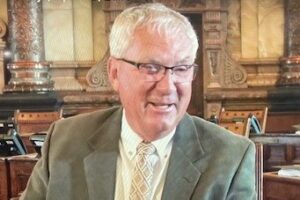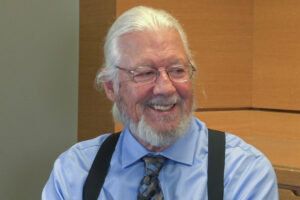Topic: Beneficial use

Interview of Fred Kerr, April 13, 2018
Interviewed by H. Edward (Ed) Flentje
Fred Kerr reflects on his 15 years in the Kansas Senate representing the 33rd Senate district. He recalls Senate leaders and fellow Senators who helped him as a freshman and whose influence guided him throughout his career. Fred talks about the process involved in securing a leadership position in the Senate and the dynamics of leadership races. He observes how relationships between competitors for leadership offices affected Senators differently and how they worked together in subsequent legislative sessions. He also reflects on how decisions were made regarding tax policy both to fund highways and public schools. Show MoreFred, who ran for Governor in 1994, comments about the increasing influence of money and monied interests in state-wide politics. A previous oral history interview of Fred Kerr is here. Show Less

Interview of Leland (Lee) Rolfs, October 28, 2019
Interviewed by Rex Buchanan
In this oral history interview recorded in 2019, Lee Rolfs explains that few regulations governed water use when he began working at the Division of Water Resources of the State Board of Agriculture in 1978. He describes how the State responded to depletion of the Ogallala aquifer by creating Groundwater Management Districts (GMD) to manage future development, and to create a comprehensive system to address water issues. Rolfs recalls how the policy positions switched over time from the State being reluctant to regulate groundwater use when the GMDs initially sought restrictions to the opposite, with the GMDs opposing regulations Show Morewhen the State sought to impose them. He recalls his work on ground-breaking litigation with Colorado over water in the Arkansas River (Kansas v. Colorado). That case spanned over 25 years of his career with the State. Rolfs expounds on the Water Appropriation Act and its importance in the development of Kansas and its limitations in addressing the issue of long-term declines in the water table. He observes that cooperation, knowledge, and education are essential for properly managing water in Kansas. Show Less
